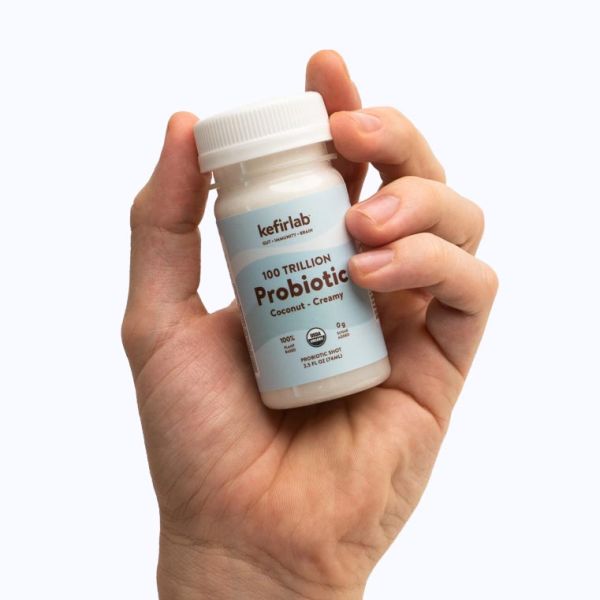Side Effects of Probiotics: Everything You Should Know [Complete Guide]

In This Article you will learn…
Probiotics have become increasingly popular as people seek to improve their gut health and overall well-being.
While probiotics offer many benefits, it’s essential to understand that they can also have side effects.
In this complete guide, we will explore the potential side effects of probiotics, how to manage them, and what you need to know to make informed decisions about their use.
Whether you’re new to probiotics or have been using them for a while, this guide will provide valuable insights to help you navigate the complexities of probiotic supplementation.
Relatively Common Side Effects of Probiotics
Digestive Issues
One of the most common side effects of probiotics is digestive discomfort. This can include symptoms such as gas, bloating, and diarrhea.
These symptoms often occur because probiotics alter the gut microbiota, leading to changes in digestion and fermentation processes.
While these side effects can be uncomfortable, they are usually temporary and may resolve as your body adjusts to the new bacterial strains.
Tips for Managing Digestive Issues:
- Start Slowly: Begin with a lower dose of probiotics and gradually increase it to allow your body to adjust.
- Stay Hydrated: Drinking plenty of water can help alleviate some of the digestive discomfort.
- Monitor Your Diet: Pay attention to your diet and avoid foods that may exacerbate symptoms.
Allergic Reactions
In some rare cases, individuals may experience allergic reactions to probiotics.
These reactions can range from mild to severe and may include symptoms such as itching, rash, and swelling.
It’s essential to recognize these symptoms early and take appropriate action.
Advice on Managing Allergic Reactions:
- Read Labels: Ensure you know all the ingredients in the probiotic supplement.
- Consult a Doctor: If you experience allergic symptoms, immediately stop taking the probiotic and seek medical advice.
- Choose Hypoallergenic Options: Look for probiotics specifically formulated to be vegan or lactose-free, coconut milk kefir and probiotic shots.
Headaches
Some people report experiencing headaches after starting probiotics. While the exact cause is not well understood, changes in gut flora are believed to influence the production of certain chemicals in the body, potentially leading to headaches.
Suggestions for Reducing Headache Occurrences:
- Stay Hydrated: Dehydration can contribute to headaches, so ensure you drink enough water.
- Monitor Your Response: When headaches occur, adjust your probiotic intake accordingly.
- Consult a Healthcare Provider: If headaches persist, consult a healthcare professional to rule out other potential causes.
Increased Histamine Levels
Specific probiotic strains can produce histamine, which may cause issues for individuals who are sensitive to histamine.
Symptoms of increased histamine levels include headaches, flushing, and nasal congestion.
Tips on Managing Histamine-Related Side Effects:
- Choose Low-Histamine Probiotics: Opt for probiotic strains that are known to produce lower levels of histamine.
- Monitor Symptoms: Monitor histamine-related symptoms and adjust your probiotic use as needed.
- Consult with a Specialist: If you have a known histamine intolerance, consult a healthcare provider before starting probiotics.
Rare Side Effects of Probiotics
Systemic Infections
Though rare, systemic infections can occur, particularly in individuals with compromised immune systems. These infections can be severe and may require medical intervention.
Probiotics are generally safe for most people, but those with weakened immune systems or underlying health conditions should exercise caution.
Case Studies and Research Findings:
- Research has shown that systemic infections are more likely to occur in individuals who are critically ill or have compromised immune systems.
- Case studies have documented instances where probiotic use has led to bloodstream infections, highlighting the need for careful consideration in vulnerable populations.
Precautions:
- Consult a Healthcare Provider: Always seek medical advice before starting probiotics if you have a weakened immune system.
- Choose the Right Probiotic: Opt for strains that have been extensively studied and are known to be safe for at-risk populations.
Unfavorable Metabolic Effects
In some rare cases, probiotics can cause unfavorable metabolic changes.
These effects might include altered metabolic rates or unexpected weight changes.
While the mechanisms behind these changes are not fully understood, they highlight the need for careful monitoring.
Discussing Metabolic Changes:
- Monitor Your Health: Keep track of any unexpected changes in weight or metabolic health after starting probiotics.
- Seek Professional Advice: If you notice significant changes, consult a healthcare professional to evaluate the cause and adjust your probiotic regimen accordingly.
Antibiotic Resistance
Another concern, albeit rare, is the potential for probiotics to contribute to antibiotic resistance. Some probiotic strains carry genes that can transfer antibiotic resistance to pathogenic bacteria in the gut.
This issue underscores the importance of choosing high-quality probiotics from reputable sources.
Overview of Current Research:
- Studies have indicated that the risk of antibiotic resistance from probiotics is low, but it remains a consideration, especially with prolonged use or in specific populations.
Safety Measures:
- Choose Reputable Brands: Select probiotics from reputable manufacturers that rigorously test their products for safety.
- Stay Informed: Keep up-to-date with the latest research on probiotics and antibiotic resistance to make informed decisions.
Factors Influencing Side Effects
Strain-Specific Reactions
Not all probiotics are created equal; different strains can cause various side effects.
Understanding which strains are in your probiotic supplement can help you anticipate and manage potential adverse reactions.
Advice on Choosing the Right Strain:
- Research Strain Benefits and Risks: Look for information on the specific strains included in your probiotic supplement.
- Consult Healthcare Professionals: If you are still determining which strains are best for you, seek advice from a healthcare provider or a probiotic specialist.
- Read Reviews and Studies: Check for reviews and scientific studies on the effectiveness and side effects of the strains you are considering.
Dosage and Duration
The dosage and duration of probiotic use can significantly impact the likelihood and severity of side effects. Starting with a high dose may increase the risk of adverse reactions, while long-term use can also pose challenges.
Tips on Proper Usage:
- Start with a Low Dose: Begin with a smaller dose and gradually increase it as your body adapts.
- Follow Manufacturer Guidelines: Adhere to the dosage recommendations provided by the probiotic manufacturer.
- Monitor Duration: Pay attention to how long you have been taking the probiotics and consider taking breaks if needed.
Individual Health Conditions
Your health conditions can significantly affect how your body responds to probiotics.
Conditions such as irritable bowel syndrome (IBS), inflammatory bowel disease (IBD), and immune system disorders can affect your reaction to probiotic supplementation.
Overview of Health Considerations:
- IBS and IBD: Individuals with IBS or IBD may experience different side effects from probiotics. It’s essential to choose strains that are specifically beneficial for these conditions.
- Immune System Disorders: If you have an immune system disorder, consult a healthcare provider before starting probiotics to ensure they are safe.
- Personalized Recommendations: KefirLab offers a Microbiome Analysis service that can provide personalized probiotic recommendations based on your unique gut health profile. Learn more about our Microbiome Analysis service.
How to Minimize Side Effects
Starting Slowly
One of the best ways to minimize side effects when introducing probiotics into your routine is to start slowly.
Gradually increasing the dosage allows your body to adjust to the new bacterial strains without overwhelming your digestive system.
Advice on How to Introduce Probiotics Gradually:
- Begin with a Low Dose: Start with the smallest recommended dose and observe how your body reacts.
- Increase Gradually: If no adverse effects occur, slowly increase the dosage over weeks.
- Be Patient: Allow time for your body to adapt before making further adjustments.
Monitoring and Adjusting
Keeping track of your body’s response to probiotics is crucial in managing side effects.
Monitoring your symptoms and adjusting your intake based on feelings can help you achieve the desired benefits without discomfort.
Tips for Effective Monitoring:
- Keep a Journal: Document your daily intake of probiotics and any side effects you experience.
- Adjust Accordingly: If you notice side effects, consider reducing the dosage or taking the probiotics less frequently.
- Seek Guidance: If unsure how to proceed, consult a healthcare provider for personalized advice.
Consulting Healthcare Professionals
It is advisable to consult with a healthcare professional before starting probiotics, especially if you have underlying health conditions.
They can provide tailored advice based on your health needs and help you choose the right probiotic product.
Importance of Seeking Medical Advice:
- Personalized Recommendations: Healthcare professionals can recommend specific strains and dosages suited to your health condition.
- Safety Assurance: They can help ensure that probiotics do not interfere with any medications or treatments you are currently undergoing.
Mention KefirLab’s Microbiome Analysis Service:
- Customized Insights: KefirLab’s Microbiome Analysis service offers detailed insights into your gut health and can help you choose the most suitable probiotic products. Discover our Microbiome Analysis service.
Who Should Avoid Probiotics?
Immunocompromised Individuals
Probiotics can pose certain risks for individuals with weakened immune systems.
Since probiotics consist of live bacteria, they can cause infections in immunocompromised individuals.
If you fall into this category, it is crucial to approach probiotic supplementation with caution.
Explanation of Risks and Safety Measures:
- Potential Infections: Immunocompromised individuals may be more susceptible to infections caused by probiotic bacteria.
- Seek Medical Advice: Always consult a healthcare provider before starting probiotics if you have a compromised immune system.
- Choose Safe Strains: Work with your healthcare provider to select probiotic strains safe for immunocompromised patients.
Individuals with Serious Illnesses
People with serious illnesses or those undergoing treatment for severe conditions should be cautious with probiotics. Introducing new bacterial strains can sometimes interact with medications or exacerbate specific health issues.
Risks Associated with Probiotic Use in Seriously Ill Patients:
- Medication Interactions: Probiotics can sometimes interact with medications, potentially altering their effectiveness.
- Worsening Symptoms: Certain health conditions may be aggravated by introducing probiotics.
Recommendations:
- Consult with Healthcare Providers: Ensure that your healthcare provider knows all supplements you are taking, including probiotics.
- Tailored Advice: Seek tailored advice from medical professionals to determine whether probiotics are appropriate for your condition.
Conclusion
Understanding the side effects of probiotics is crucial for making informed decisions about their use. While probiotics offer many health benefits, they can also cause side effects, ranging from mild digestive issues to rare but serious infections.
By being aware of these potential side effects and minimizing them, you can safely incorporate probiotics into your health regimen.
- Digestive Issues: Common but typically temporary, including gas, bloating, and diarrhea.
- Allergic Reactions: Though rare, being mindful of potential allergies is essential.
- Headaches and Histamine Levels: Be aware of these less common side effects and manage them appropriately.
- Systemic Infections: Particularly a risk for immunocompromised individuals.
- Unfavorable Metabolic Effects and Antibiotic Resistance: Important to consider, though rare.
For more insights into gut health and probiotics, visit HealthLab. Here, you’ll find a wealth of information and resources to help you maintain optimal health and cognitive sharpness.
Explore our comprehensive range of probiotic products and services at KefirLab, including our personalized Microbiome Analysis and Health Coach services.
Whether you’re looking for dairy kefir, coconut kefir, or probiotic shots, we have high-quality options tailored to your needs.
Works Cited and Relevant Studies
- National Center for Complementary and Integrative Health. (2019). Probiotics: In Depth.
- John, G. K., & Mullin, G. E. (2016). The Gut Microbiome and Obesity. Current Oncology Reports, 18(7), 45.
- Reid, G., & Bocking, A. (2003). The potential for probiotics to prevent bacterial vaginosis and preterm labor. American Journal of Obstetrics and Gynecology, 189(4), 1202-1208.
- Sanders, M. E., Merenstein, D. J., Reid, G., Gibson, G. R., & Rastall, R. A. (2019). Probiotics and prebiotics in intestinal health and disease: From biology to the clinic. Nature Reviews Gastroenterology & Hepatology, 16(11), 605-616.
- Hill, C., Guarner, F., Reid, G., Gibson, G. R., Merenstein, D. J., Pot, B., … & Sanders, M. E. (2014). The International Scientific Association for Probiotics and Prebiotics consensus statement on the scope and appropriate use of the term probiotic. Nature Reviews Gastroenterology & Hepatology, 11(8), 506-514.
- Bron, P. A., Kleerebezem, M., Brummer, R. J., Cani, P. D., Mercenier, A., MacDonald, T. T., … & Wells, J. M. (2017). Can probiotics modulate human disease by impacting intestinal barrier function? British Journal of Nutrition, 117(1), 93-107.
- Wallace, C. J. K., & Milev, R. (2017). The effects of probiotics on depressive symptoms in humans: A systematic review. Annals of General Psychiatry, 16(14).
- Sazawal, S., Hiremath, G., Dhingra, U., Malik, P., Deb, S., & Black, R. E. (2006). Efficacy of probiotics in prevention of acute diarrhoea: A meta-analysis of masked, randomised, placebo-controlled trials. The Lancet Infectious Diseases, 6(6), 374-382.
- Salem, I., Ramser, A., Isham, N., & Ghannoum, M. A. (2018). The gut microbiome as a major regulator of the gut-skin axis. Frontiers in Microbiology, 9, 1459.
Join Kefir Club
Like our probiotics, our emails are clean and good for you. Spam Free. Unsubscribe anytime.














